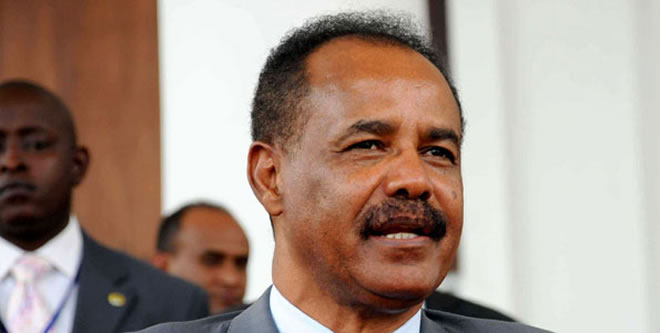
Eritrian president Issaias Aferworki. Photo/FILE

Monday, May 06, 2013
Galvanised by the Arab spring, Eritreans in exile in Europe are mobilising against the authoritarian regime of President Issaias Afeworki with a new tool -- the humble telephone.
Every week, members of the diaspora make hundreds or even thousands of automated calls to their compatriots in the eastern African nation, chosing their numbers at random and playing them one-minute recorded messages to spread dissent.
"It is time to restore our liberty and dignity," says one of the messages. In another, the mother of high-profile political prisoner Aster Yohannes recalls the fate of her daughter, who was arrested in 2003 and who has not been heard of since.
Such political statements are rarely heard in Eritrea itself, where opposition parties are banned and anyone who challenges the president -- who has ruled the tiny nation with an iron grip since independence in 1993 -- is jailed without trial, often in the harshest of conditions.
They are the work of a new generation of exiles who refuse to fall in behind traditional opposition parties, which are widely viewed as unrepresentative and divided, explains Leonard Vincent, a Paris-based specialist on Eritrea.
Unlike those opposition leaders, their passion was forged not in the war of independence but in the conditions forced upon their people today. "Their own war is against the current problems in the Eritrean nation," Vincent said.
About 1,500 Eritreans leave their country every month, according to the United Nations, paying up to 30,000 euros ($39,500) each to seek a new life free of grinding poverty and repression.
Those who make it -- refugees are often a target for people traffickers -- settle around the world, from Australia to Germany, Britain to the United States, but keep in touch over the Internet.
Their demands are simple -- the application of the 1997 constitution which calls for elections in Eritrea, and the release of political prisoners, estimated by the NGO Human Rights Watch to be about between 5,000 and 10,000.
And they have put these demands to the Eritrean people in about 100,000 recorded telephone calls made every Friday since late 2011 -- including to some members of the regime.
Ironically, "sometimes it's actually the people who don't like what we're doing that spread the message because they are not afraid", said Selam Kidane, founder of the 'Arbi Harnet' (Free Friday) movement.
The phone calls are a way of spreading dissent without putting those receiving the messages in danger, explains Kidane, a mother-of-three who is now settled in London.
In a country where freedom of expression and the press are virtually non-existent, logging onto a subversive website or tuning into a banned radio station could put their lives at risk.
But the project has involved people who are still in Eritrea. The phone calls have only been made possible, for example, after someone smuggled a telephone directory out of the country.
And a handful of those who remain are promoting the cause at great risk to themselves. "We have a little team inside the country that we have recruited via these calls. They have put up posters with our logo," Kidane told AFP.
Eritrea specialist Vincent explained that some posters take the form of fake versions of the public notices of deaths that are traditional in Eritrea.
"The photo on the fake death notices is fictitious and the message is subversive, along the lines of 'Wake up, they have stolen your freedom'," he explained.
Source: AFP